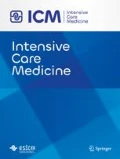Dear Editor,
In response, we would like to stress some concepts. First, to our knowledge, in controlled donation after circulatory death (cDCD) programs (absence of previous cardiopulmonary resuscitation) no case of autoresuscitation has ever been reported after 2–5 min of absence of circulation [3]. Thus, logically, at least 2 min should be used as a clear indicator of irreversibility.
Second, the no-touch period is a morally and socially important defense against suspicions of possible donor exploitation: vital support is withdrawn according to the donors’ wishes (usually reported by their next of kin) and organs are retrieved without undue interference in the process of dying after declaration of death using circulatory criteria (irreversible cessation of circulation). The donor is always treated as a means in itself and the donor’s dignity is continuously promoted.
Third, the 2 vs. 5 min no-touch period debate is above all a cultural issue. In the absence of widespread agreement, a 5-min period represents an adequate compromise because it better ensures confirmation of a spontaneously irrecoverable and sufficiently advanced dying process (a safeguard in the eyes of the relatives) and because it is unlikely to materially affect any subsequent organ function. A 5-min no-touch period is, therefore, a clinically and operationally workable tutioristic option.
We think that, at this stage, it is socially unsafe to abandon the dead donor rule in favor of a more aggressive policy. Accordingly, we stress the importance of an adequate no-touch period, which can neither be too short (autoresuscitation should be excluded) or too long (organ protection is jeopardized).
Finally, Dr. Lazaridis writes about “minimizing harms by performing the procurement under general anesthesia”. This concept is not acceptable to us. Certainly, adequate sedation is a mandatory step for withdrawal of life support during end-of-life care in conscious patients. Yet great care must be taken in order to avoid any interference with the patient’s ability to ventilate spontaneously. For this reason, general anesthesia administered before forgoing life support is morally and legally quite problematic (if combined with muscle-blocking agents, it would be considered the direct cause of death). After cessation of circulation, general anesthesia is both impossible (there is no circulation carrying any drug to the brain) and illogical (no-one would consider giving anesthesia to a cadaver).
In this complex field, therefore, we contend that the Roman advice festina lente (hasten slowly) continues to provide sensible guidance.
References
Lazaridis C (2015) “No-touch” period: no benefit for donors, high cost for recipients. Intensive Care Med. doi:10.1007/s00134-015-3969-9
Zamperetti N, Bellomo R, Latronico N (2015) Heart donation and transplantation after circulatory death: ethical issues after Europe’s first case. Intensive Care Med. doi:10.1007/s00134-015-3933-8
Shemie SD, Hornby L, Baker A, Teitelbaum J, Torrance S, Young K, Capron AM, Bernat JL, Noel L, The International Guidelines for Determination of Death phase 1 participants, in collaboration with the World Health Organization (2014) International guideline development for the determination of death. Intensive Care Med 40(6):788–797. doi:10.1007/s00134-014-3242-7
Author information
Authors and Affiliations
Corresponding author
Ethics declarations
Conflicts of interest
On behalf of all authors, the corresponding author states that there is no conflict of interest.
Rights and permissions
About this article
Cite this article
Zamperetti, N., Bellomo, R. & Latronico, N. Adequate "no-touch" period: respect for donors, no cost for recipients. Intensive Care Med 42, 135 (2016). https://doi.org/10.1007/s00134-015-3976-x
Accepted:
Published:
Issue Date:
DOI: https://doi.org/10.1007/s00134-015-3976-x

